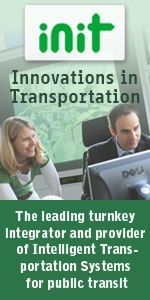

| In This Issue |
| » NEWS HEADLINES |
| » COVERAGE OF 2010 LEGISLATIVE CONFERENCE |
| » COMMENTARY |
| » TELLING OUR STORY |
| » APTA NEWS |

Check out the classifieds for job opportunities including a general manager, a director of paratransit, and a regional president with a management firm!
| COVERAGE OF 2010 LEGISLATIVE CONFERENCE |
Congressional Focus on Public Transit Issues
BY SUSAN BERLIN, Senior Editor
Rep. Earl Blumenauer (D-OR), longtime transit supporter and a member of the House Ways and Means Committee, credited  APTA members for “the work you have done to lay the foundation for livable communities” when he addressed the APTA Legislative Conference the morning of March 16. He added: “People need to hear what you have to say. What we need is a plan for civic engagement—to muster support from the community in a bad economic situation.”
APTA members for “the work you have done to lay the foundation for livable communities” when he addressed the APTA Legislative Conference the morning of March 16. He added: “People need to hear what you have to say. What we need is a plan for civic engagement—to muster support from the community in a bad economic situation.”
Regarding the partisan attacks he has seen, Blumenauer said Congress must “call a timeout to rebuild America and get the economy back on track. We have a consensus that we need to go forward and how to do it; now we need to expand our vision.” He also said the extension of SAFETEA-LU through Dec. 31, 2010, included in the HIRE Act—at the time awaiting a Senate vote—“should give us running room” to make refinements to the long-term authorization bill. [Editor’s Note: The Senate approved the bill March 17 by a vote of 68 in favor and 29 opposed. The president signed it the following day.]
Rep. Steve LaTourette (R-OH) gave outspoken support to the need for bipartisanship in public transit-related issues in his  remarks.
remarks.
“There’s no such thing as a Republican road or a Democratic bridge,” said LaTourette, who currently serves on the House Appropriations Subcommittee on Transportation, Housing and Urban Development, and Other Agencies and, during the Bush administration, chaired the Railroads Subcommittee of the House Transportation and Infrastructure (T&I) Committee. “We need to get the country back on track, renewing and rebuilding America.”
He emphasized the importance of increasing revenues to the Highway Trust Fund, whether through a 10-cent increase in the fuel tax or by shifting from gallons of fuel to vehicle miles traveled. “We need a bipartisan effort on the gas tax,” he continued. “If [T&I Chairman James] Oberstar [(D-MN)] needs them, I’ll get him 50 Republicans. If we’re asked about it later, I’ll say we increased revenues because we had to.”
LaTourette also praised the transportation community for its prompt and efficient use of American Recovery and Reinvestment Act (ARRA) funding. He noted that half the jobs created and saved through ARRA came from transportation infrastructure projects, which accounted for just 7 percent of the grants.
Other members of the House and Senate provided their own perspectives on ARRA, transportation authorization, and other  topics.
topics.
Rep. Peter DeFazio (D-OR), chairman of the T&I Highways and Transit Subcommittee, described the essential nature of transportation infrastructure to a community. “The ARRA funds were well spent, creating a lot of jobs,” he said, criticizing people who believe the federal government should have no role in job creation.
Sen. Robert Menendez (D-NJ), chairman of the Subcommittee on Housing, Transportation, and Community Development of the Senate Committee on Banking, Housing, and Urban Affairs, described how American families are facing major challenges in what he called “the worst economy since the Great Depression.”
Community Development of the Senate Committee on Banking, Housing, and Urban Affairs, described how American families are facing major challenges in what he called “the worst economy since the Great Depression.”
However, Menendez continued: “This nation sees challenges as an opportunity for growth. We need government investments to get the economy moving.”
In laying out his vision of “a new path—healthier, greener, and more energy-efficient,” Menendez noted that public transportation “is essential, both as a way to create jobs now and to link people to job opportunities.”
 Rep. John Mica (R-FL), ranking member of T&I, emphasized his agreement with Oberstar on the need for a six-year transportation authorization bill. Noting that replacing the collapsed bridge over the Mississippi River in Minneapolis/St. Paul took only 437 days, compared with the usual seven to eight years, he called for similar streamlining for public transit projects.
Rep. John Mica (R-FL), ranking member of T&I, emphasized his agreement with Oberstar on the need for a six-year transportation authorization bill. Noting that replacing the collapsed bridge over the Mississippi River in Minneapolis/St. Paul took only 437 days, compared with the usual seven to eight years, he called for similar streamlining for public transit projects.
“I’m an advocate of interconnection of all modes. We have to serve people who may have no other way to get around,” Mica said. He cited the example in his home state, where St. Augustine has an intermodal transit station that also connects with Greyhound intercity buses.
Mica concluded by telling the transit professionals: “You’re making a difference in people’s lives—especially the people who have no other options. It’s up to you to tell it like it is, educate Congress and its staffers.”
| « Previous Article | Return to Top | Return to Main | Next Article » |
|
||||||
| AMERICAN PUBLIC TRANSPORTATION ASSOCIATION |
Telephone (202) 496-4800 • Fax (202) 496-4321
Search Back Issues
